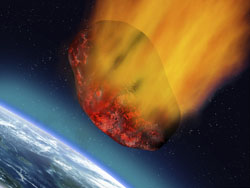Preparing for the unknown
What happens if Europe is severely flooded or if the Internet is wiped out? These and many other improbable, yet possible future events are now being considered by the EU and its policymakers in a drive to be prepared for just about anything. The EU-funded project IKNOW sought to prepare for such possibilities. Detailing 44 possible future scenarios, the project investigated how the impacts of each one could reshape life on our planet and how we could manage such situations. It identified and analysed wild (WI) cards or issues that can potentially shake our future, as well as weak (WE) signals or issues that are currently shaping it. The team looked in particular at the effects of WI-WE on European and national science and technology (S&T) policies. To achieve its aims, IKNOW employed the Foresight approach, which involves anticipating, recommending and transforming technological, economic, environmental, political, social and ethical futures. It also relied on Horizon Scanning to monitor and analyse frontier issues related to policy and research agendas, from surprises and seeds of change to trends, policies, practices and attitudes. Among its key achievements, the project identified where European research policy must be proactive and anticipated important changes in the European research system. It revealed upcoming and emerging issues on the policy radar that could have far-reaching implications for S&T in Europe. Importantly, project partners developed sophisticated frameworks to identify, classify, cluster and analyse WI cards and WE signals. It analysed WI-WE implications and their expected impact on key dimensions related to the vision of the European Research Area (ERA). It also articulated key indicators to assess the level of uncertainty and potential impact of forward-looking issues. This produced a set of IKNOW policy alerts and the IKNOW ERA toolkit representing a source of reference and inspiration for stakeholders connected to the ERA. IKNOW then investigated how to apply WI-WE to research management, identified which topics are informed by WI-WE resources, and looked at how to apply WI-WE to S&T policymaking. It also examined WI-WE applications in relation to the ERA agenda, looking specifically at how to develop and manage ERA-related research projects. Through a series of workshops, conferences, dissemination activities and the project website, IKNOW has advanced WI-WE research worldwide significantly, identifying its impacts on innovation and the ERA. The emerging policy briefs, interviews, national studies and ERA toolkit will help anticipate and manage future threats and surprises while driving innovation and inspiring researchers.



